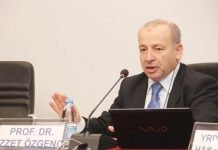Turkish government has issued detention warrants for a total of 70 teachers on Friday as part of its massive post-coup witch hunt campaign targeting the alleged members of the Gülen movement.
Turkish police launched raids across 16 provinces on Friday to detain the teachers following Ankara Chief Prosecutor Office has issued detention warrants for a total of 70 teachers over their alleged links to the movement.
Some of the teachers have been claimed to use mobile phone messaging application ByLock, while some others have been accused of having deposited money at the Islamic lender Bank Asya, which was first seized and then closed by government after the coup attempt on July 15, 2016 over his affiliation with the Gülen movement. An İstanbul court declared the Islamic lender bankrupt last November.
Turkish authorities believe that ByLock is a communication tool among the alleged followers of the Gülen movement. Tens of thousands of people, including civil servants, police officers, soldiers, businessmen and even housewives, have either been dismissed or arrested for using ByLock since the failed coup attempt on July 15, 2016.
Bank Asya’s banking license was cancelled on July 22, 2016, seven days after the coup attempt, by Turkey’s Banking Regulation and Supervision Agency (BDDK). The politicized banking watchdog had ruled for complete takeover of all shares of Bank Asya by the state-run Insurance Fund (TMSF) in May 2015.
Moreover, Ankara Chief Prosecutor’s Office has reportedly been investigating over 50 businessmen who are suspected of having withdrawn from the country’s stock exchange just before a controversial coup attempt on July 15, 2016. According to a report by pro-government Yeni Safak daily on Thursday, the businessmen in question “extraordinarily” sold off all their shares at the country’s stock exchange in a week before the July 15, 2016 putsch.
Without naming any of such businessmen, the daily said the suspects include some from the Jewish community and international corporations’ Turkey branches.
Over the past year, the prosecutor’s office has asked the Capital Markets Board (SPK) to look into suspicious transactions in four separate requests. While SPK has yet to document such moves, the daily said, leading the prosecutor to file a final request, dated Dec 11, 2017, to check out whether there were any “remarkable” move in the shares of the publicly-listed companies. The final request asks the board to cover the period before the Dec 17-25, 2013 and July 15, 2016.
Also on Friday, 20 people were detained in Bursa and Antalya provinces as part of investigation launched into the faith based Gülen movement, Turkish media reported. Eleven were detained in Bursa while nine were detained in Antalya for using ByLock and having deposited money at Bank Asya.
Meanwhile, 4 people, including 2 women, were detained in Çetibeli area of Muğla’s Marmaris district by gendarme forces over their alleged links to the Gülen movement as allegedly they are trying to flee from the country to a Greek island on Friday. A local court has arrested two women on Friday as their husband testimony has continued under police custody.
It was reported that two women, one of them is a teacher who was dismissed by a government decree under the rule of emergency over her alleged links to the Gülen movement, were alleged user of ByLock. One of the arrested women has been reported that released from prison with a judicial probe.
Turkey’s state-run Anadolu news agency has also reported on Friday that a total of 76 people, mostly dismissed public servants, were detained by border security forces in Edirne province as they were trying to flee from persecution in Turkey to Greece in 2017.
A total of 48,305 people were arrested by courts across Turkey in 2017 over their alleged links to the Gülen movement, said Turkish Interior Minister Süleyman Soylu on Dec. 2, 2017. “The number of detentions is nearly three times higher,” Soylu told a security meeting in İstanbul and claimed that “Even these figures are not enough to reveal the severity of the issue.”
Turkey survived a controversial military coup attempt on July 15, 2016 that killed 249 people. Immediately after the putsch, the Justice and Development Party (AKP) government along with President Erdoğan pinned the blame on the Gülen movement.
Gülen, who inspired the movement, strongly denied having any role in the failed coup and called for an international investigation into it, but President Erdoğan — calling the coup attempt “a gift from God” — and the government initiated a widespread purge aimed at cleansing sympathizers of the movement from within state institutions, dehumanizing its popular figures and putting them in custody.
Turkey has suspended or dismissed more than 150,000 judges, teachers, police and civil servants since July 15. Turkey’s Interior Minister announced on December 12, 2017 that 55,665 people have been arrested. Previously, on December 13, 2017, The Justice Ministry announced that 169,013 people have been the subject of legal proceedings on coup charges since the failed coup.















